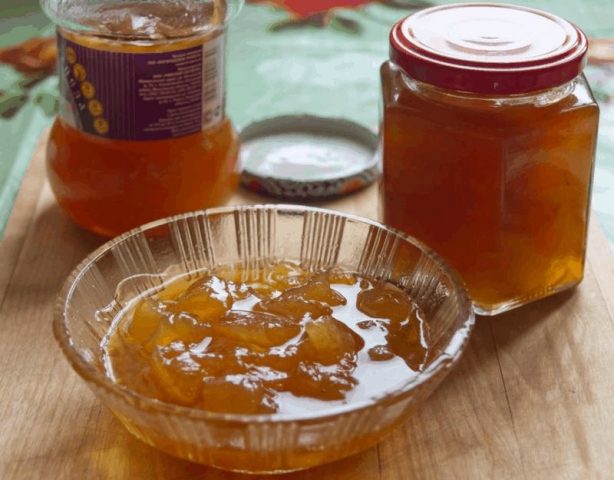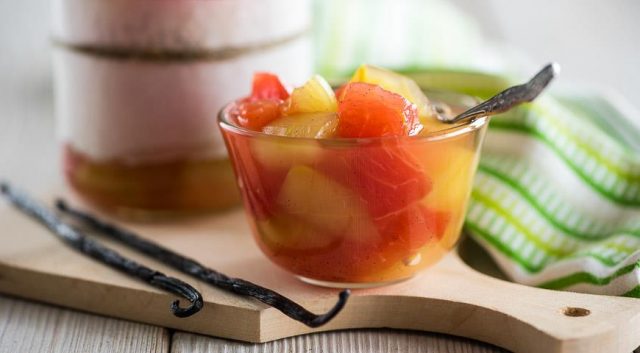Content
Summer is the season for juicy and sweet fruits. Some of the favorites are watermelon and melon. They have rightfully won their place of honor, because the high content of liquid in them allows you to quench your thirst on hot sunny days. In addition, the unique and inimitable taste makes them a favorite sweetness. So why not save a summer sweet treat for the winter, for example, prepare an unusual melon and watermelon jam. It can become the most favorite dessert during the winter season.
Rules for choosing products for jam
To prepare tasty and healthy watermelon-melon jam for the winter, you need to choose the right products for its preparation. Indeed, unfortunately, today it is very customary among suppliers of fruit and vegetable crops to improve their presentation with the help of chemistry. In order not to become one of the buyers who bought a low-quality watermelon or melon, you should carefully consider them. By looking at the rind and pulp, you can easily determine the ripeness and quality of such fruits.
Typically, in a watermelon filled with chemicals, the veins are yellow and thick. You can also conduct a small test: take a glass of water, put the pulp there, and if the water simply becomes cloudy, then this is a high-quality ripe fruit, but if the water acquires a slightly colored appearance, then the watermelon is clearly unripe and filled with chemical dyes.
In a ripe fruit of a watermelon, the sound should be muffled when tapping on it. In addition, a ripe watermelon with a strong squeeze in the hands should crunch slightly.
When choosing a melon, the first thing to look at is the stalk. In a ripe fruit, it should be dry. Also, the peel of a ripe melon should be thin and, when pressed, slightly spring. If the rind is hard or too soft, then the fruit is clearly immature or not fresh.
It is not worth buying a cracked or overripe melon, as pathogenic bacteria can collect in places where the peel is cracked.
If you follow these simple tips, you can get pretty good fruits, which will not only become a quality product for making jam for the winter, but will also be an excellent treat raw.
Melon and watermelon jam recipes for the winter
Oddly enough, but watermelons and melons are very good for making jam. In addition, such a sweet preparation can be made not only from the pulp, but also from their crusts. The crust jam turns out to be very tasty and unusual.
Melon jam is often cooked with the addition of other fruits. Apples and bananas go well with the pulp of these fruits. For taste, it is recommended to add honey and ginger. And the addition of lemon or its juice allows you to dilute the sweet taste with sourness. Also, acid contributes to the long-term storage of jam, because there are practically no acids in the composition of melon and watermelon, and this can lead to sugaring of the workpiece.
Jam from juicy pulp of watermelon and melon
To make watermelon-melon jam from juicy pulp, you will need the following ingredients:
- watermelon pulp - 500 g;
- melon pulp - 500 g;
- 1 kg of sugar;
- 250 ml of water;
- lemon - 2 pieces.
To make watermelon and melon jam, the first step is to separate their pulp from the rind and seeds. To do this, first take a watermelon, cut it in half, divide it into slices, separate the crust and remove the seeds. The same manipulations are carried out with melon, only the seeds are harvested before cutting the melon into slices. Then the slices are cut into small pieces.
The prepared pulp should be slightly overheated in order to chop up large pieces. Pour the mixture with 500 g of sugar, refrigerate, in order to form the juice.
While the melon pulp is in the refrigerator, you need to prepare the sugar syrup.
Take the remaining 500 g of sugar, pour it into a container or saucepan, fill it with water and put it on fire. Stir until dissolved and leave to boil.
While the sugar water is boiling, prepare lemon juice and zest.
Take two lemons, wash thoroughly and pat dry with a paper towel. Using a special fine grater, remove the zest from the lemons. Then cut them in half and squeeze out the juice.
Lemon juice is poured into the boiled sugar syrup and the zest is added. They are well altered and removed from the stove. Allow to cool.
Watermelon-melon pulp is taken out of the refrigerating chamber. Mix it with sugar syrup and put on fire. While stirring, bring to a boil. Cook for 40 minutes. Remove from the stove. After 3 hours, the cooking process is repeated.
Ready jam in a warm form is poured into sterilized jars. Close the lid tightly. Leave to cool completely. After the watermelon and melon jam can be sent for storage until winter.
Melon and watermelon rind jam
In addition to juicy pulp, jam can be made from watermelon and melon peels. The sweetness is quite exquisite despite the unusual ingredients.
For jam from watermelon and melon peels you will need:
- watermelon peels - 0.5 kg;
- melon peel - 0.7 kg;
- sugar - 1 kg;
- water - 650 ml;
- citric acid - 0.5 teaspoon;
- vanillin.
The separated rinds of watermelon and melon should be washed well, removed the dense part of the rind and cut into small cubes.
Next, sugar syrup is prepared. 500 g of sugar is poured into the pan where the jam will be cooked and poured with water. Put on fire, stir, bring to a boil.
Add watermelon and melon rinds to the boiling syrup and mix well. Bring to a boil, add citric acid, remove the resulting foam. Then reduce the heat and leave to simmer for 15 minutes.
The boiled jam is removed from the stove and allowed to cool for about 2-3 hours. Put on fire again, bring to a boil, cook for 15 minutes. Remove from fire. After 2 hours, repeat the cooking.
Before the fourth cooking time, add the remaining 500 g of sugar and vanillin to the jam, stir well. Put on the stove, stir, bring to a boil. Reduce heat and simmer for 20 minutes.
The prepared jam is allowed to cool slightly, then it is poured into sterilized jars. Close tightly, turn over and cover with a towel. After complete cooling, the cans with the blank can be sent for storage until winter.
Terms and conditions of storage
When properly prepared, melon jam can last for about 1 year. The optimum storage temperature ranges from 5 to 15 degrees. If it is higher, then the jam can ferment, and if it is very low, it can become sugared.
It is advisable to store such jam in a dark place so that direct sunlight does not fall on the jars, as this promotes fermentation. The lid may swell. And if this happened, it is undesirable to eat jam.
After opening the jar with the blank, watermelon and melon jam should be stored in the refrigerator for no more than 1-2 months.
Conclusion
Melon and watermelon jam is an amazing sweetness that in any winter frosts can remind you of the warm summer with its pleasant taste and aroma. It is amazing to jam both from the pulp and from the peels of melons and gourds. It can be used with tea, or it can be used as a filling for various baked goods.










